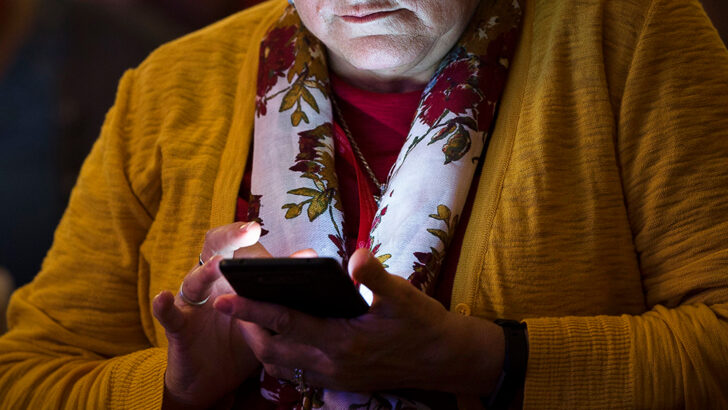About four years ago, I received a telephone call from a priest who invited a friend and I to a meeting. The priest didn’t actually say what the meeting was about – he just wondered if we might be interested in learning about his mission. We travelled to the Donegal border, and the priest introduced us to a man who told a remarkable story.
He was a life-long Catholic, a weekly-mass goer, who was married with a family and for years had appeared to be living a good life. But he had a dark secret, a silent addiction, which had enslaved him for a long time: he could not stop himself looking at pornography.
He said he would go to confession and receive absolution but the compulsion always got the better of him. Eventually he went to a particular priest who warned him that he was on the road to hell. This frightened him and he turned to prayer.
The priest’s comments were not unlike Pope Francis’ warning last month when the Pontiff called pornography a work of the devil. He warned humanity to reject this form of evil, so easily accessed via the internet: “Any cellphone”, he said. “has access to this brutality, this language of the devil”.
Indeed, anything objectifying another human being is vile – and pornography is no victimless pastime: someone, often vulnerable women and children, is being abused.
Victims
Christ warned that a man who even looked at a woman with lust was sinning – and last Sunday’s gospel made clear just how precious little children are to Jesus.
Yet this evil is spreading not just in the adult population – but also to our children through social media. It is abused children who often appear in the making of indecent images, too vile to mention.
When disgraced BBC presenter Huw Edwards was recently convicted of making indecent images of children as young as seven, it was shocking. But even more shocking was the sentence: six months jail suspended for two years. Some of the images he made fell into the worst categories.
What is wrong with admitting human weakness and selfishness and accepting responsibility for sin”
But guess who was painted as the victim? Poor old Huw. We heard his father was cruel, he felt like an outsider at the BBC because he didn’t go to Oxford, how he suffered from mental health issues.
What is wrong with admitting human weakness and selfishness and accepting responsibility for sin? What is wrong with focusing on the real victims?
Of course, Huw Edwards deserves our pity and our prayers, as do all those before the courts.
As I ponder what one has to do to get locked up these days, the US Supreme Court resumed this week and will consider a case involving the porn industry. Basically, Texas law requires porn websites to verify the age of users. It is designed to protect minors by restricting their access to inappropriate material.
Yet adult entertainers and others in the industry have the gall to claim this is an infringement of free speech under the First Amendment. No date has yet been set for the arguments.
But frankly I’m speechless.
This case coincides with a row over the €9m cost of keeping mobile phones out of children’s hands while in school. The cost is ridiculous but it is a sound idea. For a start, young people’s access to sexual images online has serious consequences.
Back in January, The Guardian reported that the National Police Chiefs Council was alarmed at the rise in sexual offending among those aged 17 or under. The data showed children were now the biggest perpetrators of sexual abuse among children.
Women’s Aid in Ireland has warned of the dangers of pornography. Following a 2022 study, the organisation stated that pornography harms both girls and boys and normalises disrespectful sexualised behaviour.
It is estimated that 3 out of five young people have viewed pornography.
Education
This comes as our politicians appear to be completely out of touch about how to educate our children about sex.
The education minister Norma Foley’s proposed new sex education programme, delivered through the Social, Personal and Health Education curriculum for 12-15 year olds has drawn a lot of criticism.
Mary Creedon, a teacher for 30 years, attended teacher training in DCU recently. She said he was “horrified” by some of the resources and teaching methods. One teaching document was called, “It’s ok to watch porn” – apparently designed to teach “critical thinking”. Creedon also described a “sex map” of various positions for hetero and homosexual couples.
It was only through grace that the man I met at the Donegal border found deliverance from his unhealthy sexual attitudes and his porn addiction.
He spoke about how Christ himself had freed him.
As the coronavirus spread, so did the virus of pornography as the number of porn searches spiked during lockdown”
When he had a compulsion to go online, he would kneel and look at the crucified Christ. And in a mysterious way, by looking at the figure of Christ, the wounds of Christ, and the face of Christ, he was healed of his compulsion.
As we left the meeting with this man and the priest, my companion and I were given some literature with prayers and an icon of the face of Christ.
En route to Belfast, I received a phone call out of the blue: it was from someone whose close friend had just told him he was addicted to pornography. He asked me to pray for his friend. I told him about the meeting I just had and arranged for an icon, with the prayer leaflet, to be sent to him.
Not long after that, the lockdown happened and things came to a halt.
And, as the coronavirus spread, so did the virus of pornography as the number of porn searches spiked during lockdown. Thank God there was also a surge in the number of searches for prayer.
Pope Francis is right: this is a demonic problem. I wonder if maybe this mission that was shared with me in early 2020 needs to be a little more visible in the Church.
Because, it’s definitely not ok to watch porn.


 Martina Purdy
Martina Purdy A woman is pictured in a file photo using her smartphone. Photo: CNS/Tyler Orsburn
A woman is pictured in a file photo using her smartphone. Photo: CNS/Tyler Orsburn 